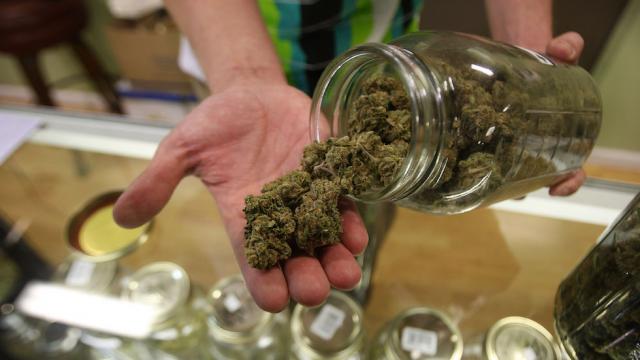Years ago, when Perry Davidson sold weed in the Israeli desert, he noticed that most of his customers weren’t just in it for the high. From cancer sufferers to those recovering from operations, most came seeking refuge from pain – without the addiction of prescription pills.
Now Davidson is founder and CEO of Syqe, a Tel Aviv-based startup that has developed “the world’s first selective dose, pharmaceutical grade medicinal plants inhaler”. In simple terms, Davidson has created a marijuana inhaler. Doctors can control the Syqe Inhaler remotely, ensuring patients a regulated, reliable dose of marijuana.
Davidson, who is puckish with a thick, close-cropped mohawk, believes his firm is a game-changer for a medical marijuana industry set to be worth $33 billion by 2024 – 37 percent of which will derive from pain management. His target market isn’t Israel but the United States: namely, replacing prescription opioids that have prompted the White House to declare a public emergency.
In 2016 63,600 Americans died from drug overdoses, two-third of which involved opioids like OxyContin, codeine, fentanyl, and heroin, to which many graduate for its availability and low cost. Over two million Americans are dependent on prescription painkillers. Yet spotty regulation, which varies wildly from state to state, makes the research and development of cannabis fraught. Just nine states allow recreational marijuana use, while 29 permit its use medically.
Enter Israel. The Startup Nation, as it calls itself, prides itself on a robust tech industry heavily backed by government funds. Its startups are pioneers in cybersecurity, artificial intelligence, drones, agriculture and many other fields. Now it is leaping ahead in cannabis-related tech.
In addition to Syqe, Israel is home to firms like vapour capture brand CannRX, genomics platform Steep Hill and MedAware, software aiming to reduce incorrect and overprescription of opioids. To Saul Kaye, an entrepreneur and founder of industry group iCAN, it’s an obvious extension of Israel’s tech prowess. “It comes down to local assets,” he says. “We have a scarcity of water, so we developed water systems. Israel is mostly desert, so we developed how to grow vegetables in the desert. Now we become experts in tech transfer.”
Cannabis is one of very few issues to unite Israel’s political landscape. Orthodox rabbis have sanctioned its use. The country has effectively decriminalised cannabis use. Freed from red tape, its entrepreneurs are bringing cannabis innovation to the US. “This is a society that sees just stigma around marijuana,” says Davidson of the US. “You need to be able to give people a drug that is predictable so they don’t reach those psychoactive effects which are unwanted.”
In 2016, Syqe signed a deal with Israeli pharma giant Teva to market its inhaler. Davidson calls it a “Trojan Horse”: entering society without any issues raised. Many in America hope it can gallop into their backyard. Larisa Bolivar is a Denver, Colorado-based consultant and executive director of the Cannabis Consumers Association. She has battled for cannabis’ induction into the American healthcare system for years. Right now, she says, it’s a ‘Wild West’.
“US technology is the best in the world, but American companies don’t want to make anything to help with marijuana,” she adds. Colorado became the first state to legalise marijuana in 2014. But politicians are still “stuck in the 60s and 70s”, she says. “Policy-wise it’s a bit of a quagmire here in the United States. We look stupid in the end.” It is similarly so in the UK, where the government has said it would reach a decision on changing cannabis laws “within the next few weeks”, following reports of children with epilepsy being denied access to cannabis oil.
Scientific research is increasingly showing how cannabis can effectively combat pain and other psychological issues, such as PTSD. Israel is years ahead. The Hebrew University of Jerusalem has a centre specialising in cannabinoid research. Clinical studies have run since 2012. Cannabis research has moved beyond the stereotypes of stoners and weed fiends, says Kaye. “And besides, everybody knows somebody who uses it for medical purposes,” he says.
That is good news for Davidson, who believes that a “ballpark two per cent” of the US population stands to benefit from medical marijuana use. “Patients are clamoring for some medication,” he says. “Big Pharma has supplied zero solutions to them.”
One such patient is Matt Kahl, a US Army veteran. Kahl suffered years of chronic opioid addiction following a serious spinal injury sustained on patrol in Afghanistan. Within months the military had him on a regimen of 60-plus pills a day. His liver failed and he developed jaundice. “The amount of drugs that was given to me for it was staggering,” he says. “I felt like they were just trying to make sure I went away, like I was a problem. But the problem was that while I was on these medications I was a bigger problem.”
In 2013 Kahl was barely functioning and suffering from acute PTSD. A friend persuaded him to smoke a joint. Everything changed. “It was really subtle,” he says, sipping a drink at one of Denver’s many craft ale breweries. “I started daydreaming, which I hadn’t done in years. It was so beautiful.”
Kahl and his family moved to Denver in 2014, where he now advocates for medical marijuana use among veterans. He has reservations about an inhaler controlled by doctors. “The ultimate decision-making in the process of treating yourself should be the patient,” he says. “The only thing that saved my life was when I started telling the doctors no [to pills].”
But he welcomes more technology and ways to erode stereotypes surrounding medical marijuana use. So does Bolivar. She hopes Israel can play an even more active role in helping get Americans off opioids. “You just have to keep making noise and showing all this anecdotal evidence and point to countries like Israel who are doing actual studies and say, ‘Hey, there’s something we can go on’.”
Credit: www.wired.co.uk




